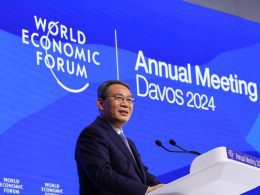In a striking and controversial development, a billionaire currently under international sanctions stands to gain $300 million from a U.S.-Congo mining deal. This situation raises numerous questions about the enforcement and effectiveness of sanctions, the ethical implications of international business practices, and the potential repercussions for U.S.-Congo relations. This article explores the details of the deal, its key players, the potential impacts, and broader geopolitical considerations.
The Deal and Its Background

The Mining Contract
The deal in question involves a lucrative mining contract in the Democratic Republic of Congo (DRC), one of the world’s richest sources of minerals, including cobalt and copper. The DRC has long been a focal point for international mining companies due to its vast natural resources. The current contract is poised to transfer significant mining rights and revenues to the sanctioned billionaire.
The Billionaire Under Sanctions
The billionaire at the center of this controversy is under sanctions imposed by the United States and the European Union for alleged corruption and other illicit activities. These sanctions are intended to restrict the individual’s ability to conduct business internationally, freeze assets, and limit financial transactions. However, the current deal appears to circumvent these restrictions, highlighting potential loopholes in the sanctions regime.
Analysis of the Deal
Legal and Ethical Implications
Sanctions Evasion
One of the primary concerns is the apparent evasion of international sanctions. This deal could set a precedent for other sanctioned individuals to find ways to circumvent restrictions, thereby undermining the effectiveness of global sanctions policies. The legal frameworks governing sanctions enforcement will likely come under scrutiny, as will the methods used to monitor and enforce compliance.
Ethical Concerns
The ethical implications of this deal are profound. By engaging in business with a sanctioned individual, companies and governments risk legitimizing and potentially funding illicit activities. This could exacerbate corruption and instability in regions like the DRC, which already struggle with governance issues.
Economic Impact
Benefits to the DRC
On one hand, the deal could bring significant economic benefits to the DRC, including increased foreign investment, job creation, and infrastructure development. However, the long-term benefits are contingent on transparent and fair distribution of the revenues, which has historically been a challenge in the DRC.
Risks of Economic Inequality
Conversely, the concentration of wealth and resources in the hands of a few could exacerbate economic inequality and social tensions within the DRC. The potential for revenue to be siphoned off by corrupt officials or elites is a significant risk, potentially leaving the broader population without meaningful benefits from their country’s natural resources.
Comparative Analysis: Sanctioned vs. Non-Sanctioned Entities
Compliance and Enforcement
| Aspect | Sanctioned Entities | Non-Sanctioned Entities |
|---|---|---|
| Legal Restrictions | Subject to international sanctions, asset freezes, and travel bans | Generally free to operate without major international restrictions |
| Business Operations | Limited by sanctions; often rely on opaque networks and front companies | Operate transparently; adhere to international business norms |
| Reputational Risk | High; associated with corruption and illicit activities | Lower; subject to reputational scrutiny but generally perceived as legitimate |
| Financial Transactions | Restricted; face difficulties in accessing global banking systems | Unrestricted; full access to international financial systems |
Economic and Social Impact
| Aspect | Sanctioned Entities | Non-Sanctioned Entities |
|---|---|---|
| Economic Contribution | Often limited due to restrictions; may involve illicit financial flows | Potentially significant, contributing to economic growth and development |
| Social Impact | Potentially negative; associated with corruption and inequality | Generally positive; can lead to job creation and social development |
| Compliance with Local Laws | Often circumvent laws; contribute to governance challenges | Typically comply with local laws and contribute to governance improvements |
Broader Geopolitical Implications
U.S.-Congo Relations
The deal has significant implications for U.S.-Congo relations. While the U.S. seeks to promote stability and economic development in the DRC, this deal complicates diplomatic efforts by involving a sanctioned individual. The U.S. government may face criticism for perceived inconsistencies in its foreign policy and sanctions enforcement.
Global Sanctions Regime
The effectiveness of the global sanctions regime is also at stake. If sanctioned individuals can continue to engage in lucrative deals, the credibility and utility of sanctions as a tool for international diplomacy and justice could be severely undermined. This case may prompt calls for stronger enforcement mechanisms and greater international cooperation to close loopholes.
Analysis Table
| Aspect | Positive Outcomes | Negative Outcomes |
|---|---|---|
| Economic Impact | Increased investment, job creation, infrastructure development | Potential for revenue misallocation, increased inequality |
| Sanctions Compliance | Highlights need for stronger enforcement mechanisms | Demonstrates potential loopholes and evasion tactics |
| Ethical Considerations | Potential boost to local economy if managed transparently | Risk of legitimizing illicit activities, worsening corruption |
| Geopolitical Relations | Could lead to strengthened U.S.-Congo economic ties if managed well | Potential strain on U.S.-Congo diplomatic relations, criticism of U.S. foreign policy |
Comparative Table
| Criteria | Sanctioned Entities | Non-Sanctioned Entities |
|---|---|---|
| Legal Compliance | Faces legal restrictions and sanctions enforcement | Operates within legal frameworks and international norms |
| Reputation | High risk of negative perception due to sanctions | Generally enjoys legitimacy and positive perception |
| Economic Contribution | Limited by sanctions, potential involvement in illicit activities | Significant, transparent contributions to local economy |
| Social Responsibility | Often criticized for negative social impacts | Typically involved in positive social and community development |
In sum, the deal involving a sanctioned billionaire in the U.S.-Congo mining sector presents a multifaceted challenge that requires careful consideration of legal, ethical, and geopolitical dimensions to ensure that the benefits are maximized while the risks are effectively managed.
Conclusion
The controversial $300 million deal between the U.S. and the Democratic Republic of Congo, involving a billionaire under sanctions, underscores the complex interplay of legal, ethical, and geopolitical factors in international business. While the deal could bring economic benefits to the DRC, it also raises significant concerns about the effectiveness of sanctions, the potential for increased corruption, and the broader implications for global governance. Addressing these challenges will require robust international cooperation and a reevaluation of how sanctions are enforced and monitored.












